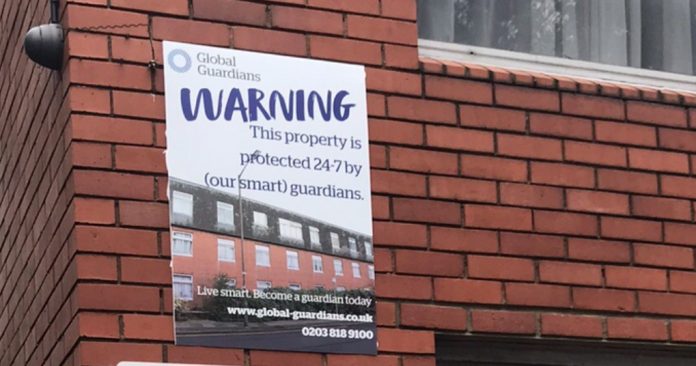Stuart Woolgar, Chief Executive of Global Guardians Management, is an outspoken campaigner to bring tighter regulation and higher ethical standards to the vacant property management sector. Here, he details why we should all aspire to operate at the highest standards in our business activities
Compliance to standards, regulations and ethical practices is critical as a demonstration to its public that an organisation is conducting itself correctly. These standards and regulations, particularly where they relate to health and safety, have and will continue to impact on and even save people’s lives and should never be dismissed as petty or irrelevant.
For agencies or businesses who contract to work for organisations in the public sector, where those organisations are open to full public scrutiny and accountability, clarity and transparency in their activities will, therefore, also need to be demonstrated.
Where there is no specific law to comply with, the next best thing is regulation, or compliance to standards of good practice, usually drawn up by the British Standards Institute (BSI) with the input of industry experts, government bodies and accredited professional or trade associations.
Regulatory compliance is particularly strict in the financial sector these days, following the financial crash a decade ago. Lessons were learned and regulations and standards have since been reviewed and considerably tightened, so are now far stricter in the endeavour to avoid a repeat of the meltdown that occurred.
Standards in the built environment
However, it is essential that standards in the built environment should also be rigorously monitored and kept up to date, especially where health and safety are concerned; those operating in the property sector need to adhere to a whole raft of both legislation and regulation, plus follow standards laid out in various codes of practice. What happened at Grenfell is an unfortunate lesson to learn from. Standards were out of date, in particular where they related to the cladding, and it should not take a further similar tragedy to bring them into line with modern building technology.
It follows, therefore, that vigilant and energetic, accredited professional bodies or trade associations, along with industry experts and thought leaders, should all play their part in ensuring members not only comply with regulations and standards but also contribute to up to date and forward-thinking where those standards are concerned. Health and safety is the responsibility of everyone and it shouldn’t be financial considerations, carelessness or the threat of litigation that ensures the highest standards are aspired to when people’s lives and wellbeing are concerned.
The problems that come with vacant property
Vacant property can be a minefield and headache to manage, but it can also be an opportunity for social good when homelessness is a national scandal and lack of affordable and easily available accommodation is in such short supply.
Empty buildings can be a magnet for a host of problems and unexpected costs. If a building looks empty, neglected or run-down, it’s an open invitation to trouble – from squatters, fly-tippers, criminals, drug dealers, even homeless people simply looking for somewhere more sheltered to spend their nights, especially during the winter months. The option of secure fencing, shutters or boarding around a site merely attracts disfiguring graffiti and doesn’t keep out anti-social or criminal behaviour; nor do CCTV or alarms; the perpetrators are usually long gone before security patrols or the police arrive. Determined thieves will target anything with a scrap value and this can cause immense damage to a property and make it potentially dangerous and unsafe to enter. Security guards and dogs generally can’t be there 24/7, the budget for that is simply impractical in the long-term unless the building is of special importance.
In tandem with all of this are the costs of business rates and insurance cover. Although some public and local authority properties are exempt from rates, and some government buildings are self-insured, not all are, so there are still costs to be borne even if a building is vacant. It is also worth remembering, that if any third party visits or trespasses into a vacant building and suffers a mishap, the property owner is still liable and ‘no win no fee’ lawyers abound, encouraging people to seek damages.
A simple solution to all the above problems associated with vacant buildings is to install property guardians in the premises through an ethical and responsible company that can turn the void into an income generator, as opposed to a drain, for as long as is necessary. They live on the site and are present 24/7, 365 days of the year.
In one fell swoop, the building becomes secured, the guardian company maintains it and ensures there are adequate living and domestic facilities there for its guardians, business rates liability is mitigated, insurance cover can benefit, income can be generated to offset any other financial charges and, importantly, an otherwise vacant building gets turned into a low-cost accommodation opportunity so the social benefit is enormous.
Compliance to health and safety standards and industry codes of practice
One point is absolutely critical when installing property guardians to secure a vacant building. For all the reasons listed at the beginning of this article, and more, an accredited guardian company, such as Global Guardians, must be used. In other words, a company which belongs to the British Security Industry Association, (BSIA) and also complies to British Standard 8584:2015 (Vacant Property Protection Services – Code of Practice) which is backed by the BSIA, Environmental Health, London Fire Brigade and many other public service bodies.
By complying to BS8584, the guardians will not only be treated responsibly and ethically, but the property owners can be reassured the guardian company is complying with every relevant aspect of current housing and property legislation and regulation, as well as all health and safety regulations. Regrettably, not all guardian companies do this which puts guardians at risk and leaves property owners liable for various problems which may occur.
If utilising the services of an accredited guardian company, their maintenance team and/or specialist contractors should carry out all works necessary to bring the property to proper occupational standards and ensure all other national and local regulations are complied with as necessary, for example, the Housing Health and Safety Rating System (HHSRS), the Occupiers Liability Act 1957 and HMO legislation.
To do this in the first instance, the guardian company should institute a site visit by accredited professionals to carry out a full risk assessment, including inspection of all security, fire, and health and safety implications. This needs to be done to comply with employers’ liability and work in tandem with property owners’ liability and the Fire Safety Order 2005. This ensures the five key areas are covered: fire, water, gas, electrical and asbestos safety. This is part of the work that the guardian company does before installing guardians into the property and they bear the cost of this, not the property owners.
Global Guardians are renowned for our pioneering work to bring better standards to the industry and our campaign to be the gold standard for property guardianship through the work we do with the BSIA, the development of the BS8584, together with a new industry standard code of practice which is currently being drafted. We are also campaigning with the GLA for better regulation of the property guardian market in London.
Regrettably, there will always be mavericks in any industry who ignore regulations and bring it into disrepute, but we are fighting back and any organisation, either public or private, who wishes to demonstrate best practice in their work, now seek us out in the knowledge that we strive for excellence, and compliance in all areas is our mantra.
Please note: this is a commercial profile
Stuart Woolgar
CEO
Global Guardians Management Ltd
Tel: +44 (0)7841 913 954
+44 (0)20 3818 9137











